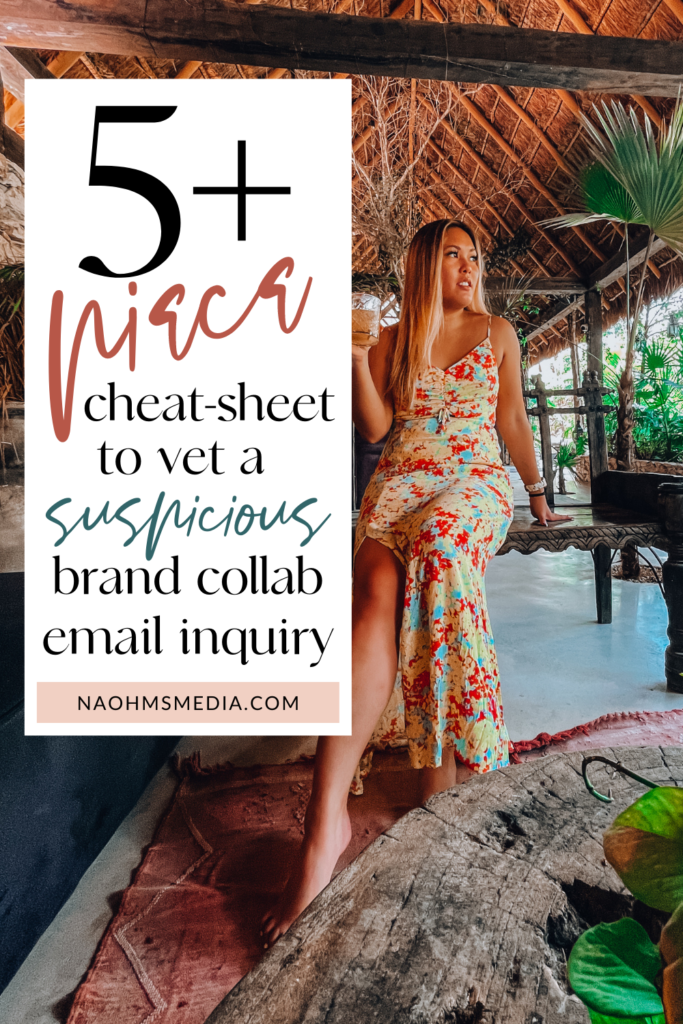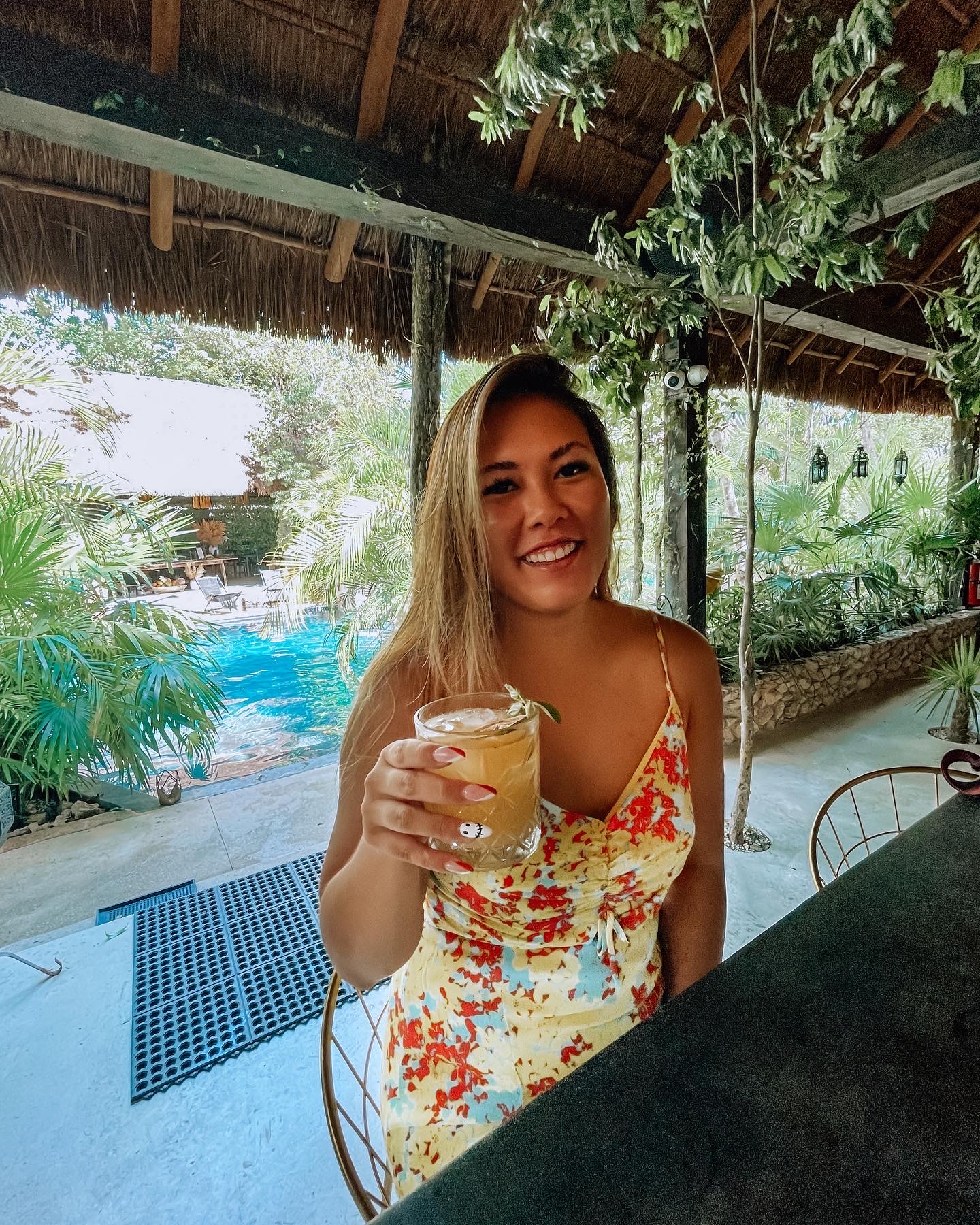
category
The 5-Piece Cheet-Sheet to Vet a Suspicious Brand Partnership Email Inquiry
For the last 2 years, we have seen a massive growth in overnight influencers. Creators and influencers are growing virally, left and right. So with this growth, brands, no matter the size, will hop on the chance to collaborate with these influencers and send them a brand partnership email… why? Because most of them don’t know what to do with what they have their hands on.
These influencers are green, so having a flooded inbox full of email inquiries, to them, means that they are doing something right and that it is the natural progression of their budding career. It’s a validation that they have social proof as a person of influence online. And because they don’t know any better, they are susceptible to falling into a trap of
- A brand offering unfair pay, free gifts or affiliate commission in exchange for a lot of deliverables
- Collaborating with a brand who isn’t even a trustworthy business, or
- A scam who just attained their personal information
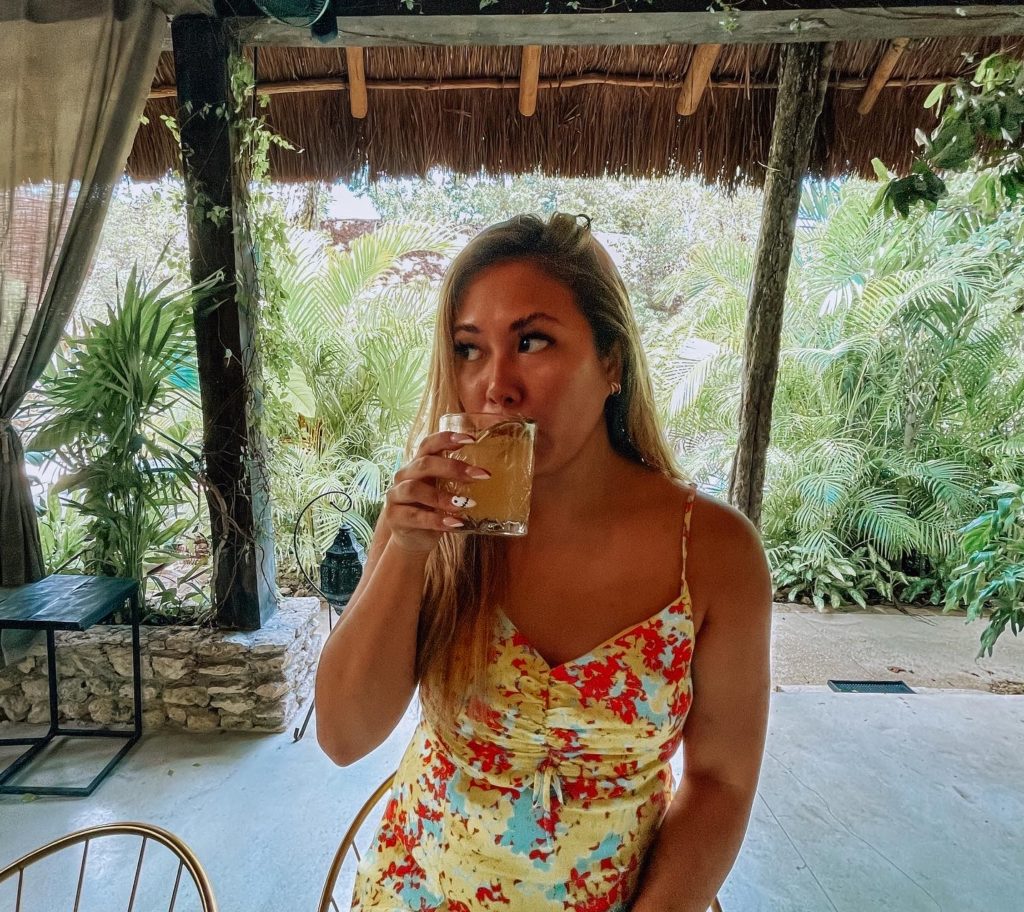
This influencer might be you. And you are probably finding this blog post on Google because you don’t know what makes a good collaboration or brand partner, or if the brand partnership email is even legitimate. Trust me, I’ve had my share of poor judgment and replied to every brand I receive messages from because I was so eager to work with them myself. I felt validated as an influencer.
But in my 10 years in the influencer industry, I’ve developed this intuition of knowing how to vet a brand partnership email inquiry. And I’m gonna let you steal my FBI methods with this cheat sheet.
The 5-Piece Cheet-Sheet to Vet a Suspicious Brand Partnership Email Inquiry
1. Email address
When brands send emails to me, the very first thing I look into is the email address. It’s an immediate red flag for me when the person reaching out to me is using a free email account (aka Gmail, Outlook, Yahoo, etc.). If a brand has a product to sell and a website to sell it on, they should have an official email account.
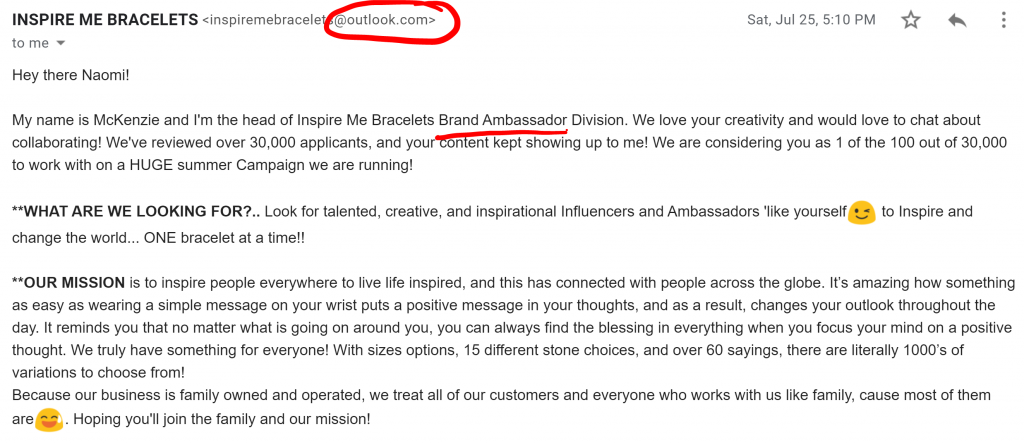
Granted, this is not completely foolproof as I have almost been scammed by a person who hacked a Nike email. Small businesses who have their business on Etsy or Amazon may be an exception since they don’t have an official website, but use your intuition and look at it on a case by case basis.
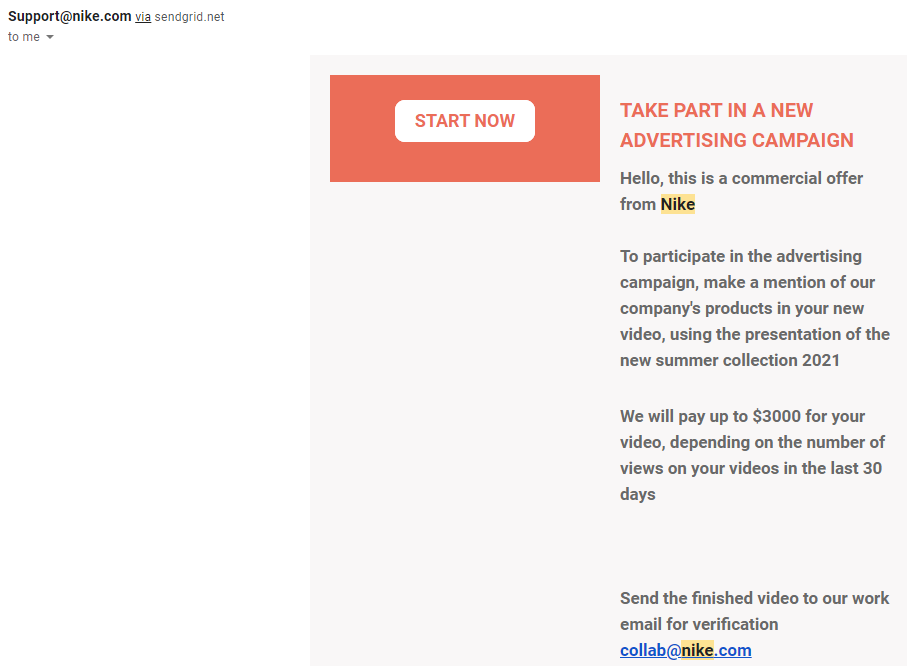
2. Who is the person emailing you?
The second thing I usually check when vetting a cold email is the name of the person. This is usually located in the signature of the email. If I feel that the email is fishy, I will look up the person on LinkedIn and verify their employment history.
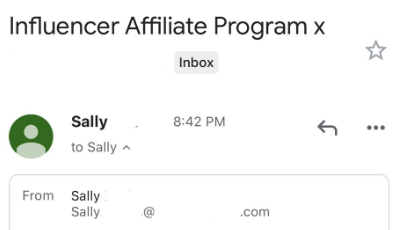

3. Level of professionalism
It’s incredibly important to keep in mind that the influencer industry is a business. Influencers run a business just as much as brands do. So professionalism is a basic essential when working on brand collaborations, not just on you as an influencer, but also on the brand. I’m not the grammar police, but email platforms and softwares have built-in spelling and grammar checks now. It’s an immediate red flag to me when an email pitch from the brand is written like a text message (ie. something as simple as not capitalizing the word “I”).

As well, anybody who overuses emojis in a work email, or even in a DM, sends the message that the sender doesn’t want to build a professional relationship with the recipient. So most of the time, it is expected that any collaboration email that isn’t professional to begin with won’t value the business relationship (good luck getting a good monetary offer).
4. Using an email marketing platform to mass email influencers
Not all emails coming from an email marketing platform are bad, but they should be vetted, and it should raise a red flag if the brand is trying to make it seem like the offer was exclusive to you. A mass brand partnership email will come from agencies or influencer platforms, and they typically ask you to apply to a campaign, answer a survey, or opt into a PR mailing list. Those are completely fine. But collaboration offers (especially paid ones) should be an exclusive message to you, not to you and hundreds of influencers with the same exact message.
The first red flag to check is simple: check to see if there is an “unsubscribe” statement or link at the very bottom of the email. This indicates that they added you to an email list (without your consent and is actually a violation of the CAN-SPAM Act) to eliminate having to email hundreds of influencers manually (by using an email template). The brand has no regard for who you are at all. They are just looking to see which influencers will take the bait, accept the offer, and will work with anyone.

The second red flag is to check how they addressed you. This is typically rare, but if they address you by the exact words on your Instagram name field (for me, it’s Naomi | LA Influencer Coach), or even something like “babe”, “dear”, or “beautiful”, it means the message isn’t genuine.
5. Website links
One of the simplest ways to vet a Brand is to check out their website, not only to see if their products and services align with your personal brand, but also to see the legitimacy of their products, the links on their website, how they take payment, and more. Take a look at some online business basics, like:
- If their social media channels are properly linked on the website
- Their legal pages (Terms and conditions, Privacy policy, Cookie Policy, etc.) are legitimate or even available. Ask yourself: if you’re a customer, would you buy from this website or from this brand?
- Product/Service reviews on Google if they exist
And here’s a Bonus: 6. Social media pages (followers, engagement, feed quality)
Checking their social media is also another simple way to vet a Brand, just like when brands check out influencers and creators. Social media is our digital footprint, and it works with companies as well.
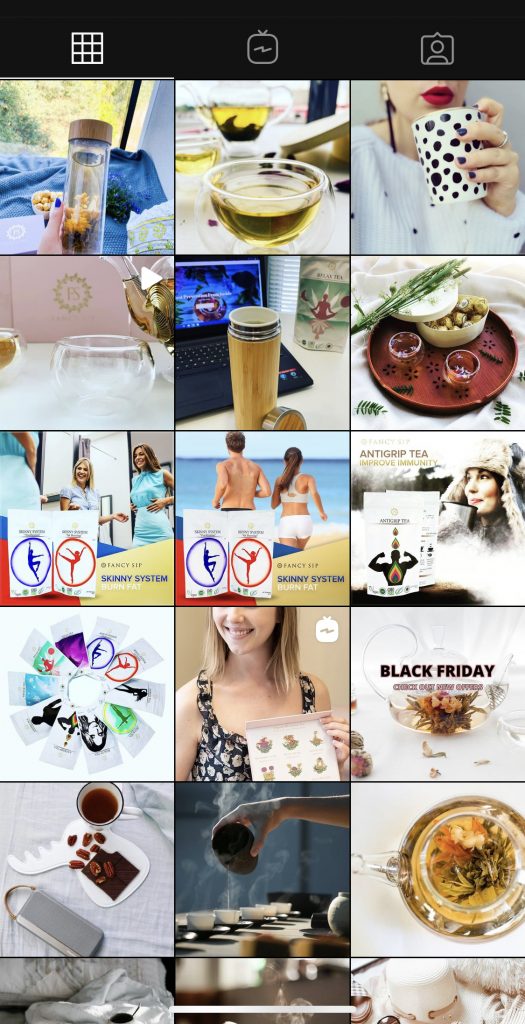
When I look up a brand on social media, I typically check the following:
- If the Brand is verified. It is usually the best way to legitimize a brand, but not necessary.
- The quality of their followers and engagement. It’s not always about the amount of followers. If a Brand has hundreds of thousands of followers, but their likes and comments don’t reflect that following, I would immediately question how legitimate they are.
- The quality of their feed. Do they have user-generated content from customers, or high quality content of their products and their products being used? Or do they have content using royalty-free images they got from the internet?
- Tagged posts. Yup. Tagged posts from customers or even influencers who have worked with them in the past. If they have previous partnerships with influencers, I would look at the influencers they have worked with and see if the quality of their branded work is on your level or higher.
- Influencers following the brand. If some of the influencers I’m following are following the brand as well, it should usually mean they’re a legitimate business. You can even go a level deeper and ask them for their experience with the brand yourself.
What should you do when you receive a suspicious brand partnership email?
When you receive a brand partnership email that seems suspicious, vet it as best as you can. If this cheat sheet checks all the boxes and the brand seems legitimate, the last thing you should to vet is to give yourself a gut check. The feeling usually is enough. Ask yourself if this brand is something your followers will like, or if this is something you would buy and use yourself. And while you are in the interest of learning what to look out for when you are getting in the radar of brands, check out the 10 ways brands may be scamming you.
And if you feel like you are ready to take your influencer career on the next level and secure 4 and 5 figure brand partnerships like a PRO, check out my new signature online course, the SponMaster: a comprehensive program designed to help aspiring and active influencers, bloggers and creators master how they can monetize their creativity and influence online. Learn how I have landed $120,000 in brand collaborations in the last 3 years as an influencer, and helped other influencers land over $200,000 in brand collaborations in 2021.
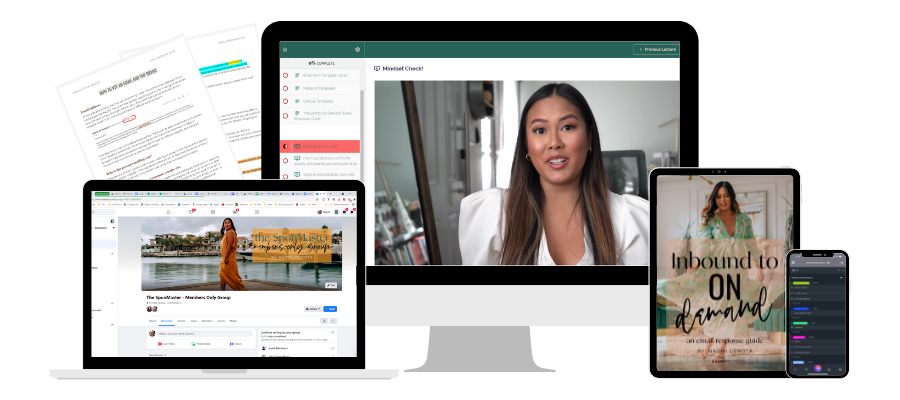
Save this post:
